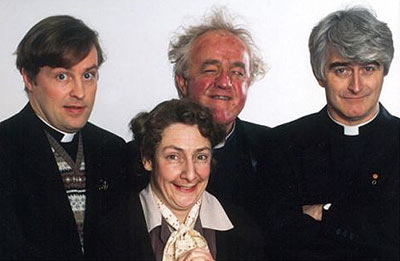That Would Be An Ecumenical Matter: Father Ted and Ireland
Published on January 30th, 2010 in: Comedy, Issues, Kiss Me I'm Irish, TV |By Hanna
Most of Ireland’s cultural presence in Western countries is undeniably depressing. Even such light-hearted fare as Breakfast on Pluto features repression of sexuality by the church, the IRA, terrorism, and attacks on women for having children out of wedlock.
Despite Irish pub propaganda and comedian Dara Ó Briain, when they’re not fighting for freedom, terrorizing London, or oppressing women, Ireland is full of alcoholic, child abusing priests. Or at least that’s what they seem to be doing. . . when they’re not busy winning Eurovision.

With the amount of things wrong in the Catholic Chuch in Ireland, even the comedy show Father Ted was potentially full of edgy or bitter parody. Obviously, the church is the main butt of the jokes. Father Ted often gets mixed up on the Church’s sometimes-paradoxical stances: torn between a moral option (accepting someone’s homosexuality in the episode “A Song For Europe” or advocating condom use in “Speed 3”) and the Church’s condemnation.
Father Jack’s ability to confound the ignorant bishops by simply answering everything with, “That would be an ecumenical matter” parodies the inability of discussion within a hierarchical structure. The sensitive issue of abuse and scandal, on the other hand, is taken care of by the Catholic Church Scandal Supplement.
Other Irish issues are also taken to the plane of the banal. Terrorism is a bomb on a milk float, and alcoholism isn’t like a Pogues song, but a lovable old priest who shouts, “FECK!” a lot. The series avoids treating any of these topics like stereotypes because the triviality of the situations makes it relatable and universal.
Though Father Ted as a character is unsympathetic, he is easy to identify with because like the other characters, there is a sense that he just ended up in that position in life: with a job he doesn’t like, in a place he doesn’t like. Even a priest who you should despise for being immoral becomes only vaguely unpleasant.
In this way the series shows that stereotypes or even common themes in popular culture are randomly selected, because the every day brand of hypocrisy and threats, and the mundane qualities of evil are part of the fabric of every society.
Time limit is exhausted. Please reload the CAPTCHA.